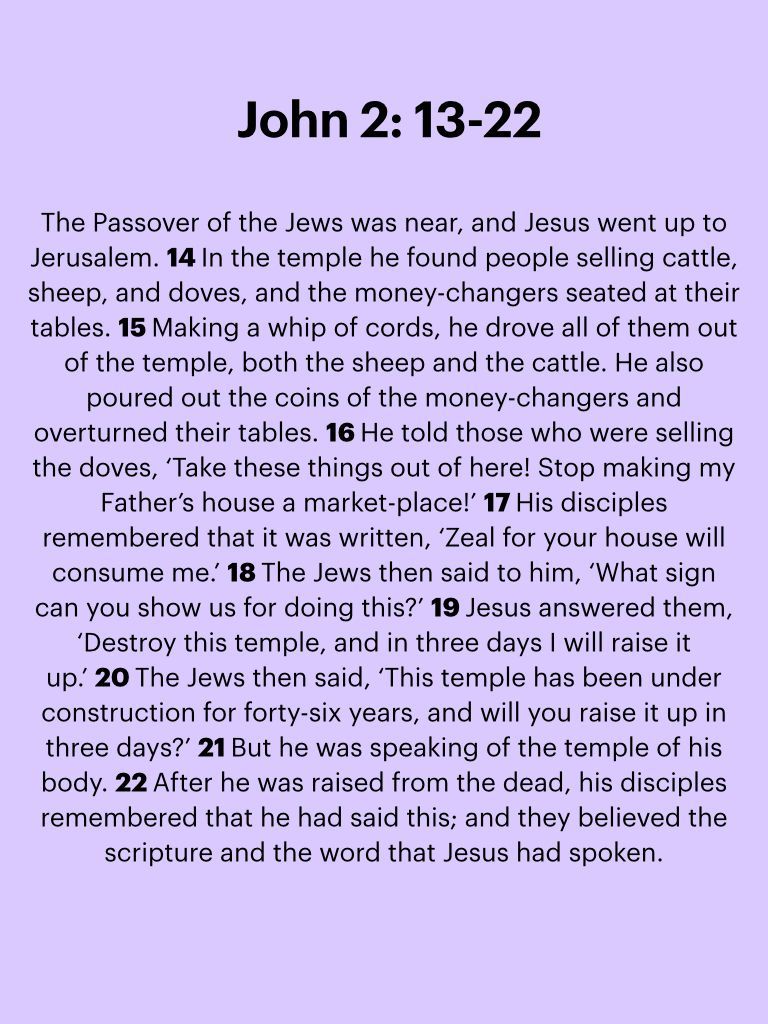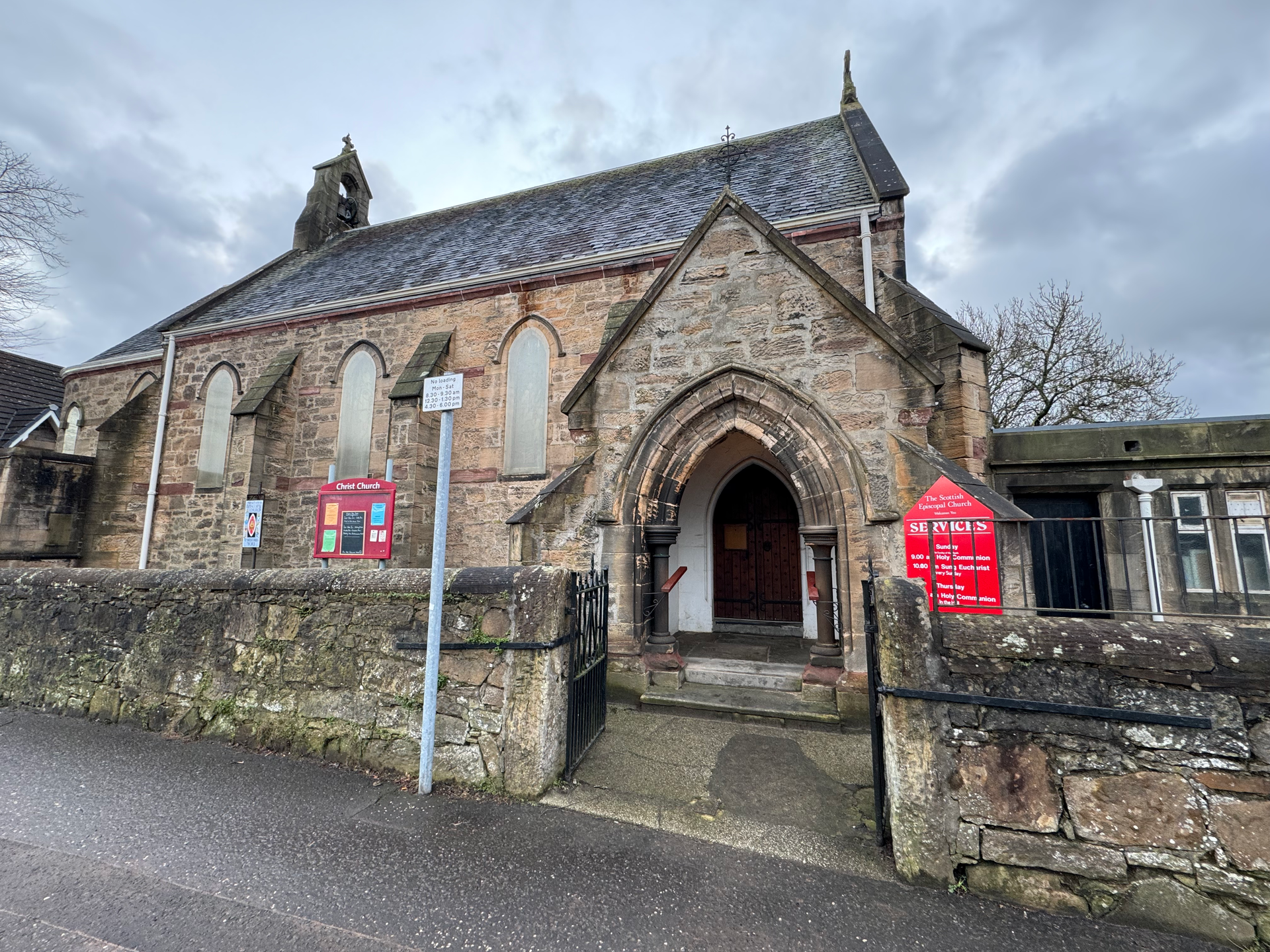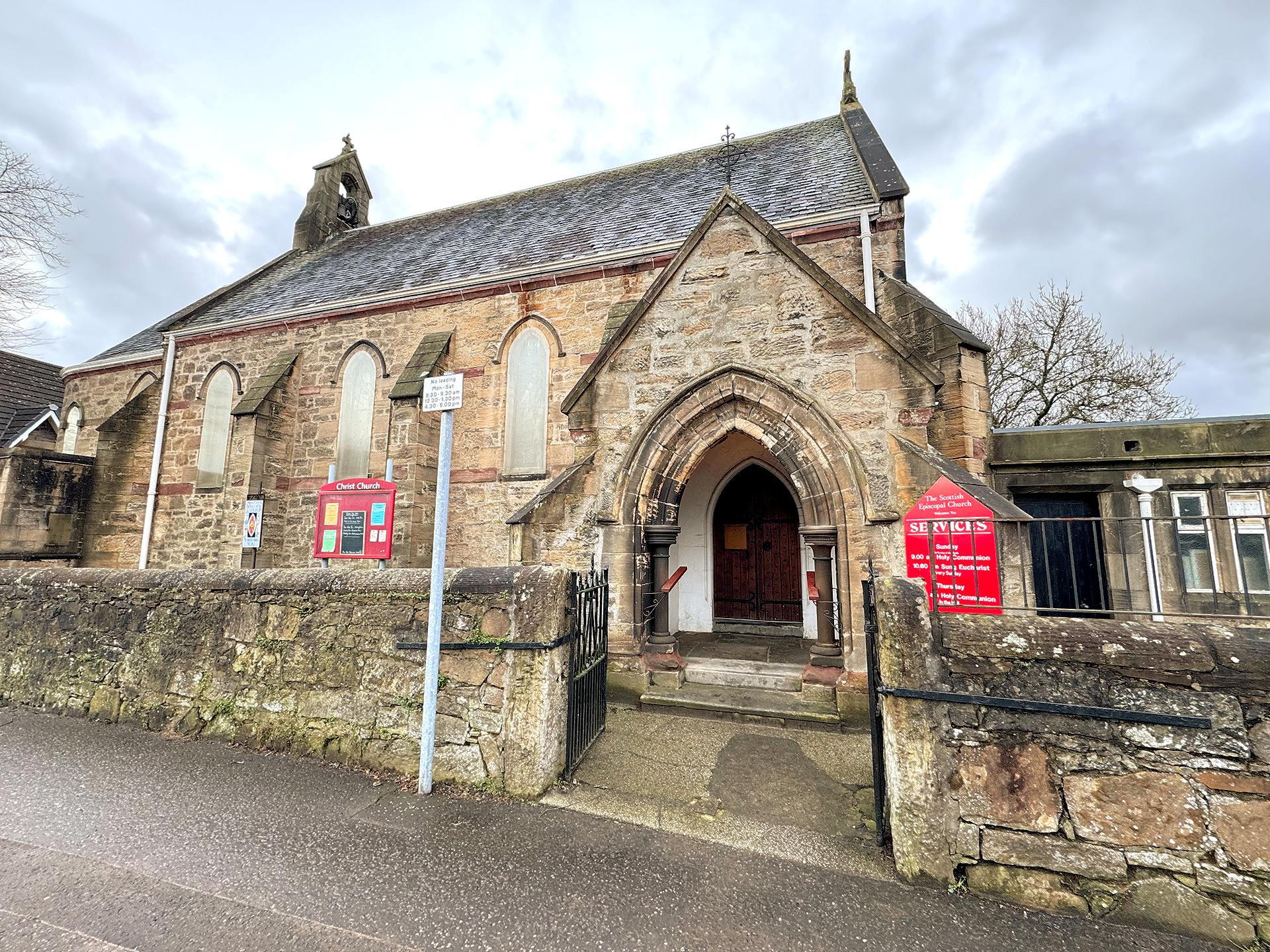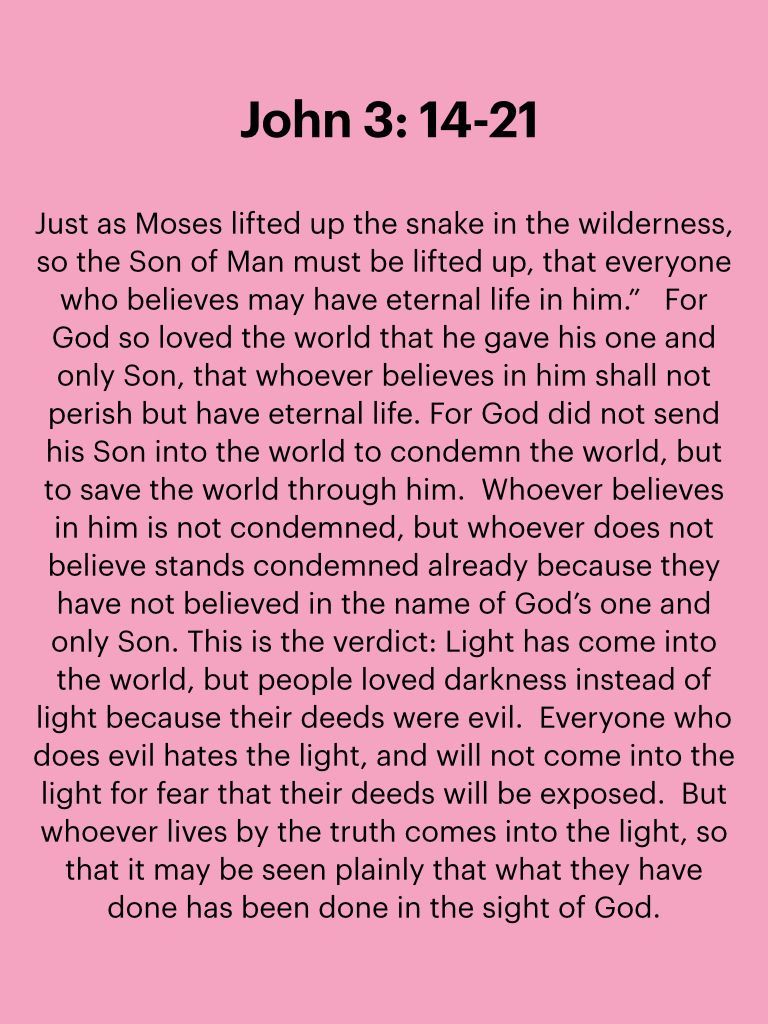Sunday Sermon
Each week Rev. Sarah Shaw will post her Sunday Sermon and the readings from that week.
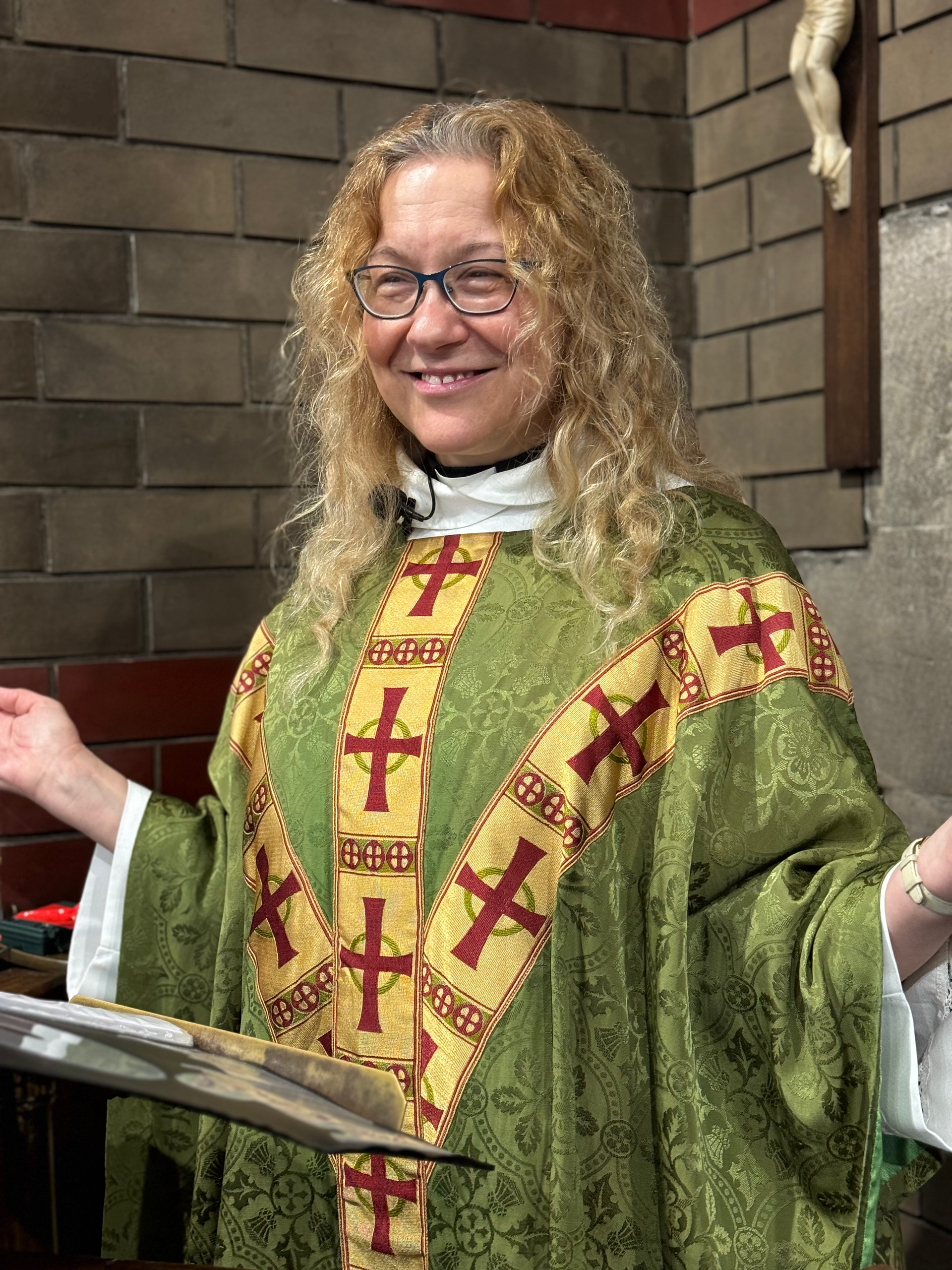
Hearts for Love Alone
Readings
Psalm 19
1 Cor. 1: 18-25
John 2: 13-22
Sermon
The account of Jesus turning over the tables of the money changers is often read in Church, and preached on, around this time in Lent. In the story of the ministry and life of Jesus, the tension is building. Jesus has warned his followers that he will undergo great suffering; be rejected by the chief priests and the elders; and be handed over to be killed. This week, we see those things coming nearer to fruition as Jesus goes to the very heart of things, the Temple, and attempts to drive out all that is not holy. (We should understand that where the words ‘the Jews’ are used here, it means the Chief Priests and the Elders, the important religious people of the day).
These people, the ‘holy’ people, were doing very nicely out of the situation in the Temple. There was some lucrative money making going on, with the money changers who exchanged the ‘temple tax’ for the sacrifices that ordinary people had to present in the Temple. No doubt, too, those who were sustained by the Temple – the chief priests and elders – did very well out of it too. And why not? This was the Temple, and the right sacrifices had to be made, regardless of how that happened and who profiteered.
In the account we’ve just heard, Jesus is livid. Instead of the Temple being a holy place of prayer, it’s become an unholy market place. What do sacrifices mean when they revolve around a money making scheme!? And the religious people condemn themselves with their own lips when they say ‘This Temple has been under construction for forty-six years’. Clearly there was a level of complacency about completing the Temple; things were fine as they were for those who were doing so well out of the status quo.
The Temple, instead of being the holiest place, was not what it should be. And God’s people were not what they should be! This is what Jesus wants to show. Many prophets down the ages had implored God’s people to understand that, rather than the ‘right’ temple sacrifices, what God wanted was a greater sacrifice - of a heart for God and for others. ‘I desire mercy, not sacrifice,’ spoke the prophet Hosea. And Amos brings these words to the people: ‘Even though you bring me burnt offerings and grain offerings, I will not accept them... Away with the noise of your songs! I will not listen to the music of your harps. But let justice roll on like a river, and righteousness like a never-failing stream!’ The people were being called to treat others justly; to be merciful; and to desire justice and righteousness. Their worship meant little when they paid no attention to these things.
Time and time again, too, in the words of the prophets, we find God’s people being called repent from all the ways they had turned from God. They were called to be hospitable to the stranger among them; merciful to widows and orphans; and generous to the poor.
In the words of our Offertory hymn today, ‘I the Lord of sea and sky’, the words of the prophet Isaiah (ch 6) are paraphrased for all of us who follow Christ today: ‘Here I am Lord, I will hold your people in my heart.’ We are called to hold all of God’s people, throughout the world – friend, neighbour, enemy, stranger – in our heart, and therefore to work for good for them. We also hear echoes of the words of Samuel in the chorus: ‘Is it I Lord? I have heard you calling in the night.’ As the hymn goes on, we hear of the God who will bear his light to all who dwell in sin; of the God who will speak his word to his people; of the God who will give his life for the poor and lame. At the end of each verse, God asks the question ‘Whom shall I send?’ to which our reply as we sing is, ‘Here I am, Lord.’
It’s not that we’re meant to think that God can’t do anything without our help. But God loves us so much that he invites us to do these things: to bear light to others; to speak his words of love; to give our lives for others. It’s a bit like when your children begin to grow up a bit and they want to help around the house. Of course you don’t need them to help. But giving them the opportunity to do things with you is a gift of a loving parent. It is in joining with God in giving – to those in sin, pain; to those in need – that our hearts grow in love. It is in joining with God in giving that we find that, in place of hearts of stone, we have hearts for love alone.
What do hearts for love alone look like?
For every one of us it will be different. But I suspect that for every one of us there will be some risk in loving. A risk of vulnerability; of loss; of having less; of giving without appreciation; of forgiving but being rejected.
We may need to be the ones to speak out at potential cost to ourselves (what an example we have in Yulia Navalnaya, the wife of the Russian anti-corruption activist, Alexei Navalny, who has said she will continue his work following his untimely death).
We may need to give up something that feels difficult, and a sacrifice, because we know it’s not good for us. We may need to go without something, or have less, because it enables us to help someone else whose need is greater. We may need to offer forgiveness or say sorry, at the risk of being turned away. In all these things we will be following the one who went before us all the way to the cross. Jesus will never ask anything of us that he has not suffered himself!
In our liturgy for Lent we ask to ‘share in the joy of his (Christ’s) obedience’. May we, in this Lent season and beyond, find joy in obedience; in sacrifice; and in hearts for love alone.
